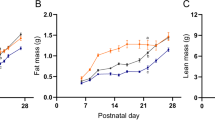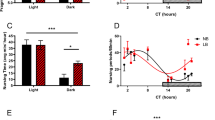Abstract
Objective:
To examine the neurobiological basis of bingeing-related eating disorders using an animal model system.
Design:
Sprague–Dawley pups were separated from dam for 3 h daily during the first two weeks of birth (maternal separation (MS)), or left undisturbed (non-handled (NH)). Pups were subjected to repeated fasting/refeeding (RF) cycles; that is, 24 h food deprivation and 24 h RF (NH/RF or MS/RF), or had free access to food and water (NH/fed control (FC) or MS/FC) from postnatal day (PND) 28–40.
Measurements:
Body weight gain and food intake were recorded. The arcuate expression of neuropeptide Y (NPY) and plasma corticosterone levels were analyzed on PND 29 and 40.
Results:
Decrease in weight gain by repeated fasting/RF cycles was smaller in MS pups than in NH. Interestingly, weight changes responding to fasting or RF increased in MS/RF compared with NH/RF. Compensatory hyperphagia was diminished in NH/RF after the third fasting trial, but persisted in MS/RF throughout the experimental period. The arcuate expression of NPY mRNA responding to food deprivation was blunted, but elevation of plasma corticosterone exaggerated, in the MS group, compared to the NH group, on PND 29 after the first fasting session. However, both the arcuate NPY mRNA and plasma corticosterone levels were increased in MS/RF, but not in NH/RF, on PND 40 after the six sets of fasting/RF cycles, compared to the free FC groups.
Conclusion:
Experience of neonatal MS may lead to an exaggerated feeding response to repeated fasting/RF challenges at adolescence, perhaps, due to increased responsiveness of the hypothalamic–pituitary–adrenal gland axis. Additionally, the results suggested that an increased action of the hypothalamic NPY may not be necessary to induce compensatory hyperphagia following food deprivation.
This is a preview of subscription content, access via your institution
Access options
Subscribe to this journal
Receive 12 print issues and online access
$259.00 per year
only $21.58 per issue
Buy this article
- Purchase on Springer Link
- Instant access to full article PDF
Prices may be subject to local taxes which are calculated during checkout




Similar content being viewed by others
References
Wonderlich SA, Brewerton TD, Jocic Z, Dansky BS, Abbott DW . The relationship of childhood sexual abuse and eating disorders: a review. J Am Acad Child Adolesc Psychiatry 1997; 36: 1107–1115.
Koo-Loeb JH, Costello N, Light KC, Girdler SS . Women with eating disorder tendencies display altered cardiovascular, neuroendocrine, and physiological profiles. Psychosom Med 2000; 62: 539–548.
Putignano P, Dubini A, Toja P, Invitti C, Bonfanti S, Redaelli G et al. Salivary cortisol measurement in normal-weight, obese and anorexic women: comparison with plasma cortisol. Eur J Endocrinol 2001; 145: 165–171.
Gluck ME, Geliebter A, Lorence M . Cortisol stress response is positively correlated with central obesity in obese women with binge eating disorder (BED) before and after cognitive-behavioral treatment. Ann NY Acad Sci 2004; 1032: 202–207.
Plotsky PM, Meaney MJ . Early, postnatal experience alters hypothalamic corticotrophin-releasing factor (CRF) mRNA, median eminence CRF content and stress-induced release in adult rats. Mol Brain Res 1993; 18: 195–200.
Suchecki D, Tufik S . Long-term effects of maternal deprivation on the corticosterone response to stress in rats. Am J Physiol 1997; 273: R1332–R1338.
van Oers HJ, de Kloet ER, Levine S . Early vs late maternal deprivation differentially alters the endocrine and hypothalamic responses to stress. Dev Brain Res 1998; 111: 245–252.
Liu D, Caldji C, Sharma S, Plotsky PM, Meaney MJ . Influence of neonatal rearing conditions on stress-induced adrenocorticotropin responses and norepinephrine release in the hypothalamic paraventricular nucleus. J Neuroendocrinol 2000; 12: 5–12.
Strack AM, Sebastian RJ, Schwartz MW, Dallman MF . Glucocorticoids and insulin: reciprocal signals for energy balance. Am J Physiol 1995; 268: R142–R149.
Cavagnini F, Croci M, Putignano P, Petroni ML, Invitti C . Glucocorticoids and neuroendocrine function. Int J Obes 2000; 24: S77–S79.
Tempel DL, Leibowitz SF . Adrenal steroid receptors: interactions with brain neuropeptide systems in relation to nutrient intake and metabolism. J Neuroendocrinol 1994; 6: 479–501.
Zakrzewska KE, Cusin I, Stricker-Krongard A, Boss O, Ricquier D, Jeanrenaud B et al. Induction of obesity and hyperleptinemia by central glucocorticoid infusion in the rat. Diabetes 1999; 48: 365–370.
Jimenez-Vasquez PA, Mathe AA, Thomas JD, Riley EP, Ehlers CL . Early maternal separation alters neuropeptide Y concentrations in selected brain regions in adult rats. Brain Res Dev Brain Res 2001; 131: 149–152.
Husum H, Mathe AA . Early life stress changes concentration of neuropeptide Y and corticotrophin-releasing hormone in adult rat brain. Lithium treatment modifies these changes. Neuropsychopharmacology 2002; 5: 756–764.
Stanley BG, Leibowitz SF . Neuropeptide Y injected in the paraventricular hypothalamus: a powerful stimulant of feeding behavior. Proc Natl Acad Sci USA 1985; 82: 3940–3943.
Kalra SP, Dube MG, Pu S, Xu B, Horvath TL, Kalra PS . Interacting appetite-regulating pathways in the hypothalamic regulation of body weight. Endocr Rev 1999; 20: 68–100.
Schwartz MW, Woods SC, Porte JD, Seeley RJ, Baskin DG . Central nervous system control of food intake. Nature 2000; 404: 661–671.
White BD, Dean RG, Martin RJ . Adrenalectomy decreases neuropeptide Y mRNA levels in the arcuate nucleus. Brain Res Bull 1990; 25: 711–715.
Cintra A, Fuxe K, Solfrini V, Agnati LF, Tinner B, Wikstrom AC et al. Central peptidergic neurons as targets for glucocorticoid action. Evidence for the presence of glucocorticoid receptor immunoreactivity in various types of classes of peptidergic neurons. J Steroid Biochem Mol Biol 1991; 40: 93–103.
Ponsalle P, Srivastava LS, Uh RM, White JD . Glucocorticoids are required for food deprivation-induced increases in hypothalamic neuropeptide Y expression. J Neuroendocrinol 1992; 4: 585–591.
Makimura H, Mizno TM, Isoda F, Beasley J, Silverstein JH, Mobbs CV . Role of glucocorticoids in mediating effects of fasting and diabetes on hypothalamic gene expression. BMC Physiol 2003; 3: 1–13.
Kim HJ, Lee JH, Choi SH, Lee YS, Jahng JW . Fasting-induced increases of arcuate NPY mRNA and plasma corticosterone are blunted in the rat experienced neonatal maternal separation. Neuropeptides 2005; 39: 587–594.
Lee JH, Kim HJ, Kim JG, Ryu V, Kim BT, Kang DW et al. Depressive behaviors and decreased expression of serotonin reuptake transporter in rats that experienced neonatal maternal separation. Neurosci Res 2007; 58: 32–39.
Tauscer J, Pirket W, Willeit M, de Zwaan M, Bailer U, Neumeister A et al. [I-123] beta-CIT and SPECT reveal reduced brain serotonin transporter availability in bulimia nervosa. Biol Psychiatry 2001; 49: 326–332.
Stamatakis EA, Hetherington MM . Neuroimaging in eating disorders. Nutr Neurosci 2003; 6: 325–334.
Fairburn CG, Harrison PJ . Eating disorders. Lancet 2003; 361: 407–416.
Polivy J . Psychological consequences of food restriction. J Am Diet Assoc 1996; 96: 589–592.
Rorty M, Yager J, Rossotto E . Childhood sexual, physical, and psychological abuse in bulimia nervosa. Am J Psychiatry 1994; 151: 1122–1126.
Grilo CM, Masheb RM . Childhood psychological, physical, and sexual maltreatment in outpatients with binge eating disorder: frequency and associations with gender, obesity, and eating-related psychopathology. Obes Res 2001; 9: 320–325.
Paxinos G, Watson C . The Rat Brain in Stereotaxic Coordinates. Academic Press: San Diego, 1986.
Jahng JW, Houpt TA, Kim SJ, Joh TH, Son JH . Neuropeptide Y mRNA and serotonin innervations in the arcuate nucleus of anorexia mutant mice. Brain Res 1998; 790: 67–73.
Choi SH, Kwon BS, Lee S, Houpt TA, Lee HT, Jahng JW . Systemic 5-hydroxy-L-tryptophan down-regulates the arcuate CART mRNA level in rats. Regul Peptides 2003; 115: 73–80.
Graham B, Chang S, Lin D, Yakubu F, Hill JO . Effect of weight cycling on susceptibility to dietary obesity. Am J Physiol 1990; 259: R1096–R1102.
Stein LJ, Stellar E, West DB, Greenwood MRC, Foster GD, Feurer I et al. Early-onset repeated dieting reduces food intake and body weight but not adiposity in dietary-obese female rats. Physiol Behav 1991; 51: 1–6.
Sea MM, Fong WP, Huang Y, Chen ZY . Weight cycling-induced alteration in fatty acid metabolism. Am J Physiol Regul Integr Comp Physiol 2000; 279: R1145–R1155.
Kalra SP, Dube MG, Sahu A, Phelps CP, Kalra PS . Neuropeptide Y secretion increases in the paraventricular nucleus in association with increased appetite for food. Proc Natl Acad Sci USA 1991; 88: 10931–10935.
Swart I, Jahng JW, Overton JM, Houpt TA . Hypothalamic NPY, AGRP, and POMC mRNA responses to leptin and refeeding in mice. Am J Physiol Regul Integr Comp Physiol 2002; 283: R1020–R1026.
Bi S, Robinson BM, Moran TH . Acute food deprivation and chronic food restriction differently affect hypothalamic NPY mRNA expression. Am J Physiol Regul Integr Comp Physiol 2003; 285: R1030–R1036.
Sindelar DK, Mystkowski P, Marsh DJ, Palmiter RD, Schwartz MW . Attenuation of diabetic hyperphagia in neuropeptide Y-deficient mice. Diabetes 2002; 51: 778–783.
Namkoong C, Kim MS, Jang PG, Han SM, Park HS, Koh EH et al. Enhanced hypothalamic AMP-activated protein kinase activity contributes to hyperphagia in diabetic rats. Diabetes 2005; 54: 63–68.
Timofeeva E, Picard F, Duclos M, Deshaies Y, Richard D . Neural activation and corticotrophin-releasing hormone expression in the brain of obese (fa/fa) and lean (fa/?) Zucker rats in response to refeeding. Eur J Neurosci 2002; 15: 1013–1029.
Kim YM, Lee JY, Choi SH, Kim D, Jahng JW . RU486 blocks fasting-induced decrease of neuronal nitric oxide synthase in the rat paraventricular nucleus. Brain Res 2004; 1018: 221–226.
Jahng JW, Lee JY, Yoo SB, Kim YM, Ryu V, Kang DW et al. Refeeding-induced expression of neuronal nitric oxide synthase in the rat paraventricular nucleus. Brain Res 2005; 1048: 185–192.
Ladd CO, Owens MJ, Nemeroff CB . Persistent changes in corticotropin-releasing factor neuronal systems induced by maternal deprivation. Endocrinology 1996; 137: 1212–1218.
McIntosh J, Animan H, Merali Z . Short- and long periods of neonatal maternal separation differentially affect anxiety and feeding in adult rats: gender-dependent effects. Brain Res Dev Brain Res 1999; 113: 97–106.
Iwasaki S, Inoue K, Kriike N, Hikiji K . Effect of maternal separation on feeding behavior of rats in later life. Physiol Behav 2000; 70: 551–556.
Kalinichev M, Easterling KW, Plotsky PM, Holtzman SG . Long-lasting changes in stress-induced corticosterone response and anxiety-like behaviors as a consequence of neonatal maternal separation in Long-Evans rats. Pharm Biochem Behav 2002; 73: 131–140.
Kochan Z, Goyke E, Karbowska J, Slominska E, Swierczynski J . The decrease of rat postprandial plasma triglycerol concentration after multiple cycles of starvation–refeeding. Horm Metab Res 2001; 33: 26–29.
Kim YW, Scarpace PJ . Repeated fasting/refeeding elevates plasma leptin without increasing fat mass in rats. Physiol Behav 2003; 78: 459–464.
Corwin RL, Buda-Levin A . Behavioral models of binge-type eating. Physiol Behav 2004; 82: 123–130.
Corwin RL, Wojnicki FHE, Fisher JO, Dimitriou SG, Rice HB, Young MA . Limited access to a dietary fat option affects ingestive behavior but not body composition in male rats. Physiol Behav 1998; 65: 545–553.
Marcus MD, Kalarchian MA . Binge eating in children and adolescents. Int J Eat Disord (Suppl) 2003; 34: S47–S57.
Birketvedt GS, Drivenes E, Agledahl I, Sundsfjord J, Olstad R, Florholmen JR . Bulimia nervosa––a primary defect in the hypothalamic–pituitary–adrenal axis? Appetite 2006; 46: 164–167.
Diaz-Marsa M, Carrasco JL, Basurte E, Pastrana JI, Saiz-Ruiz J, Lopez-Ibor JJ . Findings with 0.25 mg dexamethasone suppression test in eating disorders: association with childhood trauma. CNS Spectr 2007; 12: 675–680.
Acknowledgements
We thank Drs ND Geary and TH Moran for helpful comments on this study. This study was supported by Neurobiology Research Program of KMOST & the Korea Research Foundation Grant funded by MOEHRD (KRF-2006-353-E00017) given to JWJ.
Author information
Authors and Affiliations
Corresponding authors
Rights and permissions
About this article
Cite this article
Ryu, V., Lee, JH., Yoo, S. et al. Sustained hyperphagia in adolescent rats that experienced neonatal maternal separation. Int J Obes 32, 1355–1362 (2008). https://doi.org/10.1038/ijo.2008.108
Received:
Revised:
Accepted:
Published:
Issue Date:
DOI: https://doi.org/10.1038/ijo.2008.108
Keywords
This article is cited by
-
Neonatal- maternal separation primes zymogenic cells in the rat gastric mucosa through glucocorticoid receptor activity
Scientific Reports (2018)
-
Impact of perinatal exposure to high-fat diet and stress on responses to nutritional challenges, food-motivated behaviour and mesolimbic dopamine function
International Journal of Obesity (2017)
-
Early life stress experience may blunt hypothalamic leptin signalling
Journal of Biosciences (2017)



